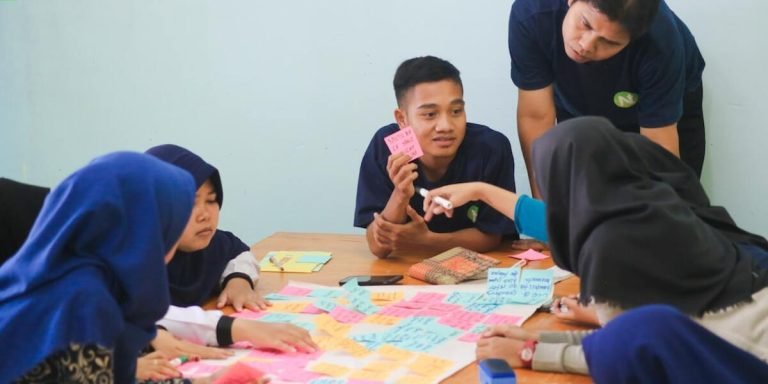ADHD Resources for Parents: Key Insights and Supportive Solutions
Navigating the world of childhood education can often feel like uncharted territory, especially when it comes to finding effective ADHD resources for parents. This mental health disorder is characterized by symptoms including difficulty maintaining focus, hyperactivity and impulsive behavior. As a parent or an educator engaging with a child diagnosed with Attention Deficit Hyperactivity Disorder (ADHD), you’ll understand that these varying manifestations present unique challenges in educational settings.
These challenges necessitate well-researched solutions tailored specifically for teaching young ones with this condition. To help you through this journey, we have compiled key insights into managing the intricacies involved in educating children affected by ADHD while also equipping you with supportive measures designed specifically keeping their needs in mind. We aim to empower parents and educators alike so they may confidently provide enriching learning experiences that accommodate all learners – because every child deserves access to quality education.
Did you know?
Research suggests that Parent-Child Interaction Therapy (PCIT) has shown significant improvements in ADHD symptoms, with changes maintained up to 6 years post-treatment.
Understanding ADHD: Resources and Guidance for Parents
ADHD, or Attention Deficit Hyperactivity Disorder, is a neurodevelopmental disorder that can pose certain challenges in education. In this technological era of 2023, it’s encouraging to know there are plenty of resources available for parents and educators alike navigating the learning journey with an ADHD child.
A key component is understanding what exactly ADHD entails and recognizing its effects on a child’s ability to learn. Utilizing technology properly isn’t about replacing traditional teaching methods but rather integrating these tools innovatively into existing curriculums to enhance their effectiveness. For instance, children with ADHD may struggle with focus; however, educational apps designed specifically for such issues can help maintain attention through interactive tasks tailored around individual capabilities.
Parents should be proactive learners too by keeping up-to-date information about advances in tech-integrated educational strategies via online blogs or forums dedicated towards childhood education support. Additionally engaging constructively partaking webinars and using digital platforms hosting insightful TED talks from leading experts worldwide could also provide practical strategies alongside emotional support while dealing with daily challenges incurred by this condition.
Navigating Diagnosis and Professional Support
Navigating the course of ADHD diagnosis and seeking professional support can be a complex journey for parents. Be assured, you’re not alone – let’s look at some effective “ADHD resources for parents” to guide you through this process.
Firstly, pinpointing the symptoms that suggest your child might have Attention Deficit Hyperactivity Disorder (ADHD) is fundamental. Remember, occasional restlessness or distraction doesn’t necessarily equate to ADHD; extended patterns are what matters here. Note these behaviours over time since they form crucial inputs towards an accurate diagnosis.
Secondly, seek expert opinion promptly if you observe consistent signs like impulsive actions, difficulty focusing on tasks or hyperactive tendencies in various scenarios beyond the usual playfulness expected from children their age.
Professional evaluations aren’t meant merely for labeling but more so as guides toward structured learning strategies benefiting both educators and students alike.
Technology contributes significantly to modern-day education processes especially concerning special needs instruction.. Accessibility-oriented tech tools help teachers design interactive curriculums making lessons engaging yet easily understood by kids with ADHD.
Assistive technology software could greatly improve reading comprehension abilities while literacy apps foster better writing skills amongst youngsters dealing with ADHD-related challenges.
Finding networks offering parental assistance would further strengthen your understanding about managing day-to-day situations regarding childhood schooling post-ADHD-diagnosis. Parent training programs provide insights into behavior management techniques which influence positive outcomes during stressful instances thus improving overall family life quality too!
Creating an Effective Home Environment for Children with ADHD
Creating an effective home environment is crucial for the growth and development of children with ADHD. The first step towards this is by understanding what ADHD implies.
Attention Deficit Hyperactivity Disorder (ADHD) presents unique challenges to both parents and educators, including hyperactivity, impulsivity, or difficulty focusing that can interfere with a child’s ability to learn effectively. Fostering an at-home setting that bolsters their learning capacity becomes vitally important.
Technology now offers various ADHD resources for parents in 2023 which significantly ease this process. For instance, there are numerous assistive technology tools designed specifically for individuals with attention disorders such as interactive games/apps improving focus levels while making learning fun and engaging at the same time.
Moreover integrating structured routines into daily activities using digital calendars or reminder apps helps children grasp structure better boosting cognitive skills overtime. Keeping track on electronic devices where they spend most of their time could also prove beneficial in monitoring progress over specific periods offering insights into pattern behaviors and potential strategies moving forward.
Do not undermine traditional techniques though! They’re still valuable today just like earlier times – consistency remains key in any parenting strategy even more so when dealing with ADHD condition: creating quiet study spaces free from distractions; sticking onto schedules ensuring everything runs smoothly; encouraging them reward system inducing positive reinforcement every single achievement no matter how small it might seem initially- each these steps builds up longer run ultimately leading successful educational journey ahead thriving amidst challenge presented before us!
Educational Strategies to Empower Parents of Children with ADHD
Understanding and managing Attention Deficit Hyperactivity Disorder (ADHD) in children can be an arduous journey, both for the child and their parents. Hence, it’s crucial to have educational strategies that empower not just educators but also parents who are often grappling with multiple challenges while trying to provide a nurturing environment at home.
One such comprehensive approach is Technology Integration in Education. In this digital era where technology has permeated all aspects of life; education, more than ever before needs its inclusion too. Especially so when addressing issues like ADHD which might require special tools or teaching methodologies for effective understanding.
Interactive learning apps tailor-made for kids dealing with ADHD could play a significant role here as they tend to make lessons enjoyable while improving focus levels significantly. Similarly incorporating adaptive technologies – software packages designed particularly keeping children with attention disorders in mind can offer immense assistance too.
Moreover, internet forums serve as adhd resources for parents by providing them access to expert advice from around the globe along with insights into experiences of other families navigating similar circumstances — possibly ushering hope amidst tangles.
Collaborative Approaches Between Educators and Families
For successful technological integration in education, it is critical to explore various tools that are available online. From interactive educational games to adaptive software programs – each resource is crafted differently but strives towards one goal – helping students with ADHD learn better.
To start off on the right foot as an educator or parent of a child with ADHD: understand your student’s unique strengths and weaknesses. Many apps and websites offer customized assessments based on which you can formulate individualized learning plans.
Next up, encourage regular engagement via digital platforms such as Zoom sessions or Google Classroom meetings. It’s not just about sharing lessons; these platforms also provide an excellent opportunity to share feedbacks bi-directionally – from teachers-to-parents and vice versa.
An important thing that we need to remember is that while technology lets us bring classroom-like experiences at home; nothing compares to human interaction when it comes down to teaching ethics or life skills necessary beyond academics.
Therefore keep open communication lines whether they’re through face-to-face consultations post school hours or friendly phone calls discussing how the child coped today– let them know there exists continuous support at all times!
Utilizing Technology and Tools in ADHD Management
In the ever-evolving age of digitalization, technology has become an indispensable tool for education. Especially when it comes to children with ADHD, integrating technology into their learning process can substantially enhance their focus and understanding.
Harnessing technological advancements is one way parents can access valuable adhd resources for managing this condition effectively in 2023. There are a plethora of useful apps developed specifically to aid students with attention deficit hyperactivity disorder (ADHD), which cater towards different needs including organizational skills, time management abilities and concentration enhancement.
Applications such as Evernote helps students organize notes efficiently while RescueTime assists them by keeping track of spent on each task; ensuring they don’t indulge excessively in a single activity. For improving focus, there’s StayFocused – an app that prevents distractions from other websites during study periods.
Moreover, assistive devices like noise-canceling headphones have proven beneficial in creating ADHD-friendly environments by blocking out extraneous noises that could potentially distract or disturb these students.
Educational platforms online offer multiple interactive activities designed specially for kids with attention disorders. These unique exercises geared toward maintaining engagement levels contribute significantly towards making learning enjoyable rather than burdensome—something essential for all young learners but particularly those grappling with ADHD challenges.
Finally yet importantly, forums and web communities where experienced educators share insights about teaching strategies tailored to pupils coping with this neurodevelopmental disorder serve as priceless adhd resources for parents seeking guidance or advice regarding fostering optimal educational atmospheres at home.
Building a Support Network: Connecting With Others on the ADHD Journey
In the era of technology-driven learning, creating a solid support network for ADHD children is not only beneficial but also crucial. As parents or educators dealing with kids affected by Attention Deficit Hyperactivity Disorder (ADHD), you may often find it challenging to comprehend their distinctive needs and behavior patterns. But remember, you’re not alone on this journey.
The digital age has led to an explosion in readily available online resources that can serve as guides on this process. Websites dedicated to education tech offer numerous platforms where parents and educators can connect, share experiences, learn from each other’s triumphs and mistakes while empowering themselves with knowledge about best practices for teaching students with ADHD.
Apps such as ADDitude—a premier source providing valuable insights into ADHD—also provide assistance through educating people about various aspects of the disorder like possible causes, symptoms &, diagnostic procedures among others; effectively demystifying many misconceptions around it. This forms a part of your arsenal in understanding how best to nurture young minds grappling with ADHD challenges at school & home alike.
Digital forums are another important element within these supportive networks due to their capability for real-time interaction between parents & teachers across different locations worldwide who face similar issues regarding childhood education vis-à-vis having brains wired differently than most.
Finding Local and Online ADHD Support Groups
A supportive community is invaluable when navigating through educational challenges related to ADHD. It provides a platform where you can share experiences, learn from others’ journeys with this condition, exchange useful information about adhd resources for parents, and find comfort in knowing that you’re not alone.
Start by reaching out locally. Schools often have resource centers or counselor offices where details on these kind of supports are available. They may be able to direct you towards specific parent-oriented groups within your vicinity who meet up regularly to discuss common issues faced due to their child’s condition.
However, being busy education professionals and caregivers might make attending regular meetings difficult. That’s why turning to online platforms can provide flexibility without compromising support accessibilities.
Online forums allow connectivity at one’s convenience while offering extensive adhd resources for parents needing assistance around the clock – something valuable during those sleepless nights when posed with overwhelming questions regarding children’s’ learning prospects associated with ADHD diagnosis.
Workshops, Seminars, and Continuing Education for Parental Skill Development
Workshops, seminars, and continuing education programs have proven to be effective adhd resources for parents. At first glance, it might seem overwhelming to add another responsibility or commitment into the mix of an already busy schedule. However, these avenues offer you essential tools and insights that can help make your journey smoother.
Firstly we must consider workshops – they are typically short-term learning activities designed around a specific theme or issue. The practical structure provides a hands-on approach which is targeted at enhancing parenting skills specifically when dealing with ADHD in children.
Next are seminars; focused gatherings where you listen to experts speak about their experiences with childhood ADHD management techniques usually using technology integration . These platforms often provide new perspectives on how educators handle different scenarios related to this condition effectively within classroom environments too.
Continuing Education Programs serve as the most comprehensive resource among them all. Spanning over longer periods- several weeks or even months- these dedicated courses allow ample time absorption of information gradually instead rushing through content .
Conclusion
In the journey of parenting and educating a child with ADHD, knowledge is indeed power. With these key insights into ‘ADHD resources for parents’, you are better equipped to navigate this path – fostering your child’s growth while also caring for your own well-being. It may be challenging at times, but remember that every hiccup encountered is an opportunity to learn more.
We encourage you not just stop here; our website holds an ocean of information about childhood education and offers ample supportive solutions both for educators as well as parents like yourself. So dive in! Let us continue on this learning adventure together because ultimately everything we do revolves around one common goal – helping our children realize their full potential.







